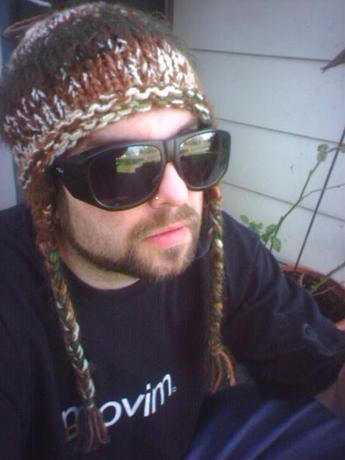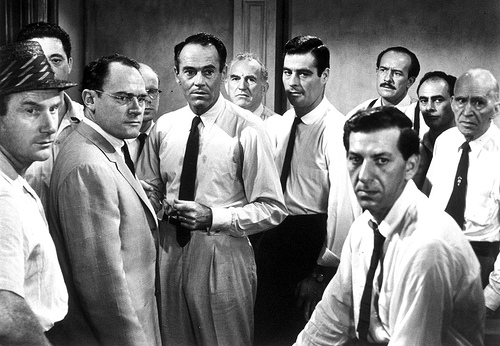|
You are reading the older HTML site Positive Feedback ISSUE 45september/october 2009
Sonic Satori - What is the Future of the High
End? What is Wrong with Us?
The birth of "i-Fi" and the inclusion of the young With the Rocky Mountain Audio Fest approaching—a show many consider to be the best (over the mammoth CES) high end audio gathering in the country—I felt obligated to write a sort of Jerry Maguire mission appeal to the industry in order to shake things up, and bring in this future I hear everybody talking about. We all know where the future is, and quite frankly we're not doing anything about it. We're not taking any relevant action because we don't force ourselves to change enough in order to not only embrace the new, but innovate around it, educate about it, and support it in a way the audiophile community hasn't been able to do since perhaps the mid-seventies. This industry, this global brotherhood of people honestly (well, some not so honestly) concerned with sonic integrity, keeps referring to the past as a way to exist in the present, rather than using it as a teacher that has not only prepared us for the present, but given us a glimpse of the future. Our biggest problem is that we are so quick to blink at that very glimpse every time it manifests in something that is alien to us.
The simple fact is: The audio industry (which is us) is putting on conventions and planning its business practices around a demographic that was baited and hooked thirty years ago by this very same industry. And so we squander tremendous opportunities to potentially reach millions of new people. These people are, at this very second, online discovering new music in an entirely different way. The rules have not only been broken, but the entire game has been rebooted and rebuilt. The old model no longer works, and it's time we looked to fresh blood to liven things up. You know why we need fresh blood, new faces? Because they are the ones excited about new music, and they are discovering new ways to both obtain it and play it back every day (and yes, much of it is indeed legal). Not to mention of course, that the young will be buying high-end audio products (or not, depending on the choices we make today) in the coming years. So these potentially future Hi-fi heads could be potentially ushering in yet another chapter in the life of the high end business. This could be the birth of i-Fi. But, this industry is directly correlated to the new dawn of information/media/music delivery and this means everything. The way we are discovering and listening to our music is a sea of change once again, beyond the introduction of the compact disc. It's equal to (perhaps even more changing) than the invention of the LP itself. The marriage of new media and new technology designed around delivering that media has opened so many vortexes of applications. It is difficult to even comprehend the changes we are currently experiencing. I'm not talking about whether any of these avenues offer high fidelity. Many of them simply do not because the market dictates that it really doesn't matter (in terms of quality), but many of them give us all the foundation we need to build a high performance stereo system around this new delivery mechanism. What remains at the center of all this, still, all these years later? The music; our ultimate source, drives the culture through these new technologies. Have you seen the deals the major labels are now signing (and have already signed) with sites like Spotify, Rhapsody, and of course itunes! There are countless ways to acquire music online these days, and many of them are as legitimate as any record store you could ever walk into (and yes, I still believe in the record store: there are ways for Hi-fi dealers and record stores to work together). Do not talk about this new music as if there is nothing being created that is of any value. There is a ton of great music out there. You just have to find it and that is easier than ever! So, we have millions of people listening to, excited about, sharing, and discovering new music at a pace unprecedented in our lifetime. The iPod sparked a cultural revolution and what do we do? What do we say to those millions of people already running this free software called iTunes? What is our answer to the greatest, most intuitive music cataloging/ripping/playing software ever created? More software with price tags ranging from $295 to $600 that works with iTunes! We tell them this software enhances the performance; that what they have is not good enough. There are millions of listeners in homes with iTunes and Hi-fi systems, and yet as opposed to shilling yet another costly add-on we should be teaching them how to use iTunes, how to take advantage of its many options, and how to integrate the software into their already existing systems. This is what our industry has been waiting for! Users across the globe, united by a singular music program that can in fact be used as a source like any other.
We know how to make this work: iTunes can drive a system amazingly well when married to the proper hardware (mostly in the form of a USB DAC) that does not need to cost thousands of dollars to reproduce music. This is the fact that many manufacturers are unwilling to accept. They do not think long term. Instead of seeing this amazing global connection as an opportunity—a way to start the conversation regarding higher performance audio—many of them continue to pad the demographic always seeking to adopt the obscure. They thumb their noses at the prospect of having their users' computers be the main source in their home Hi-fi system while filling their heads with irrelevant biases. That demographic, the one we've been catering to all these years is, quite literally dying. This is the age of the network and we are still flipping our rolodexes. All we need to do is embrace this online millennium through innovation and excitement. The tools are there, but we're not utilizing them in order to excite and engage the young! They've already got half (if not more) of what they need to pull the trigger on high fidelity. We however, need to reach out to them through their music, not ours. Generations change things, like it or not, and if there's one thing I can proudly say of my generation: we have changed the rules in a way previously unfathomable to our parents and grandparents. So how does the high-end audio community appeal to these rule breakers? Talk to them about the new Radiohead record. Tell them there is a way to experience their music in a way that will simply blow their minds. They don't care about the umpteenth re-pressing of Stravinsky's The Firebird! Find out about the new Bat for Lashes album or some of the new releases on labels like Sub Pop, Epitaph, ANTI-, or Warp for example. See what's getting heavy plays and downloads on iTunes, Spotify, Amazon, Rhapsody, Last.fm, or Pandora. The new user wants to hear their music, and they want to hear it now. Ask your dealers to set up computer audio listening stations and be sure they're tied into appropriately priced systems (for entry-level consumers). You can offer differing levels of Hi-fi and resolution: good, better, best, and so on. Be sure to tell perspective clients about the ability to broadcast their entire digital library around their home and outside by the pool! Show them the different options in both wired and wireless technologies. Educate and excite them. Inform them of some of the websites for which to find quality music and better-quality downloads. Explain the differences in file formats and ask them to bring in their own iPods. Be sure you are prepared with the latest docks, cables, USB interfaces, and DACs so the customer can experience how easy it is to integrate their portable hard-drive into a decent stereo system. Make the user feel like they are already a part of something; not like a person who needs to buy their way in with expensive equipment. The power has been handed over to them anyway, so act as a guide and not a car salesman. Put your company on Facebook and offer new and exciting deals through updates on Twitter. Sign up for Ping and blast multiple networks at once about your new products. Or offer incentives for new customers and followers through your micro-blogging. Find a way to spread your message on YouTube and be sure people can view your website from any decent smart phone on a 3 or 4g network. Don't bank on Audiogon for the entirety of your web presence. Make your own sites interactive (allowing for comments and forums for example) so the user can feel like they're a part of the community, even if they live across the planet. You can hate all you want but have you seen Monster's website lately? Check it out HERE (and scroll to the bottom of the page). You can find the company on all these social networking sites. None of this costs much money and would take about as much time as we all spend talking with our co-workers and colleagues on the phone or on the sales floor. Consumerism has taken on wholly new forms. We can use each one to our advantage, but we need to actually use them! The question is: do we want to join the revolution or continue to try and impress ourselves while the world revolves around us? I for one take pride in turning young people onto new music and better sound, and believe it or not, they truly get it. You can't start a meaningful conversation with the youth by telling them what is wrong with what they have. You can however get their attention by taking what they've got and showing them how to make it better. Isn't that what this is all about anyway? So stop talking at the younger generation and start talking with them. We will all reap the rewards and perhaps learn about some great new music in the process. Welcome to the 21st century. This is the first part in a series that I will be working on for PFO. I've had requests to write how-tos on getting the most from your iPod and iTunes; by linking them to your Hi-fi. So, I'll be doing that and more. Stay tuned and we welcome your input! Send your comments or "feedback" to [email protected] and we will post it posthaste!
|


